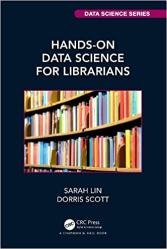Hands-On Data Science for Librarians
- Добавил: literator
- Дата: 11-04-2023, 02:51
- Комментариев: 0
 Название: Hands-On Data Science for Librarians
Название: Hands-On Data Science for LibrariansАвтор: Sarah Lin, Dorris Scott
Издательство: CRC Press
Год: 2023
Страниц: 201
Язык: английский
Формат: pdf (true)
Размер: 12.4 MB
Librarians understand the need to store, use and analyze data related to their collection, patrons and institution, and there has been consistent interest over the last 10 years to improve data management, analysis, and visualization skills within the profession. However, librarians find it difficult to move from out-of-the-box proprietary software applications to the skills necessary to perform the range of Data Science actions in code.
This book will focus on teaching R through relevant examples and skills that librarians need in their day-to-day lives that includes visualizations but goes much further to include web scraping, working with maps, creating interactive reports, Machine Learning, and others. While there’s a place for theory, ethics, and statistical methods, librarians need a tool to help them acquire enough facility with R to utilize Data Science skills in their daily work, no matter what type of library they work at (academic, public or special). By walking through each skill and its application to library work before walking the reader through each line of code, this book will support librarians who want to apply Data Science in their daily work. Hands-On Data Science for Librarians is intended for librarians (and other information professionals) in any library type (public, academic or special) as well as graduate students in library and information science (LIS).
Rather than take sides, this book takes a broad view of what constitutes Data Science and highlights five interdependent elements. These include both mathematics and statistics on the computational side. With or without a graphical user interface, Data Science is made real through computer programming. Practitioners of data science bring extensive subject matter knowledge. Their expertise enables them to communicate their conclusions through data visualizations, often providing pictures that speak louder than numbers.
As a programming language, R was designed for statisticians to analyze data interactively. R’s statistical and academic origins stand in contrast to other programming languages used for Data Science. R is an object-based programming language, where code and outputs are stored as objects to be acted upon later. Algebra might store a single value or mathematical expression in a variable; R can hold single or multiple variables, or values, in each object. R lets us work with data interactively through the use of code. When we write code in R, we are usually creating and saving data objects of various classes according to our needs. We can then conduct operations and/or analyses on these data objects in our R session(s).
This chapter is a brief introduction to Machine Learning (ML), but unlike the rest of the book, this chapter will stay reasonably high level and not include any coding. ML code requires knowledge of advanced mathematics (linear algebra); while learning to do ML is possible, the background knowledge and theory behind the steps covered in this chapter require in-depth explanations beyond the scope of this work. Learning or re-learning linear algebra takes time. However, there is still a significant benefit from understanding the process, even if you can’t replicate it on your own (yet). You can still benefit from knowing the process to better interact with ML in your work and assist your library users. The benefits of learning ML are closely related to its ubiquity in our lives. It powers many applications and systems that librarians and library users rely on for professional and personal work. Professionally, we see ML in predictive search and the search results of discovery systems and research databases we use and maintain daily.
Key Features:
Only Data Science book available geared toward librarians that includes step-by-step code examples
Examples include all library types (public, academic, special)
Relevant datasets
Accessible to non-technical professionals
Focused on job skills and their applications
Contents:
Скачать Hands-On Data Science for Librarians
Внимание
Уважаемый посетитель, Вы зашли на сайт как незарегистрированный пользователь.
Мы рекомендуем Вам зарегистрироваться либо войти на сайт под своим именем.
Уважаемый посетитель, Вы зашли на сайт как незарегистрированный пользователь.
Мы рекомендуем Вам зарегистрироваться либо войти на сайт под своим именем.
Информация
Посетители, находящиеся в группе Гости, не могут оставлять комментарии к данной публикации.
Посетители, находящиеся в группе Гости, не могут оставлять комментарии к данной публикации.

